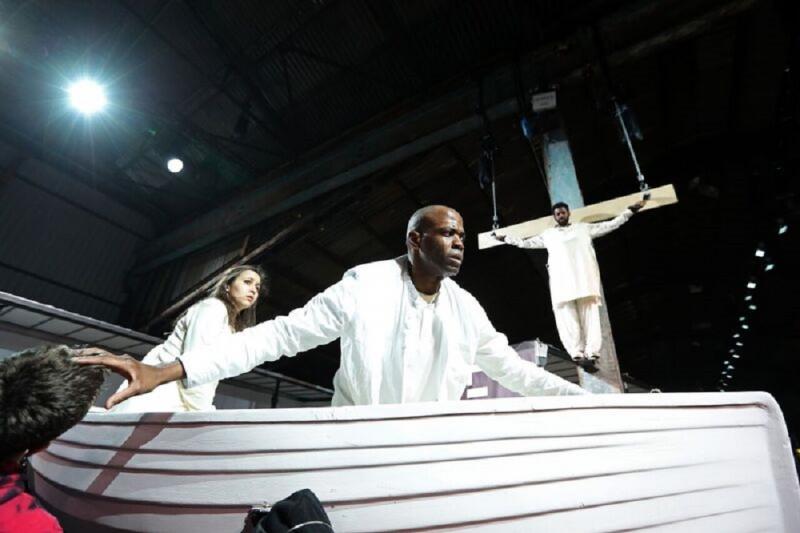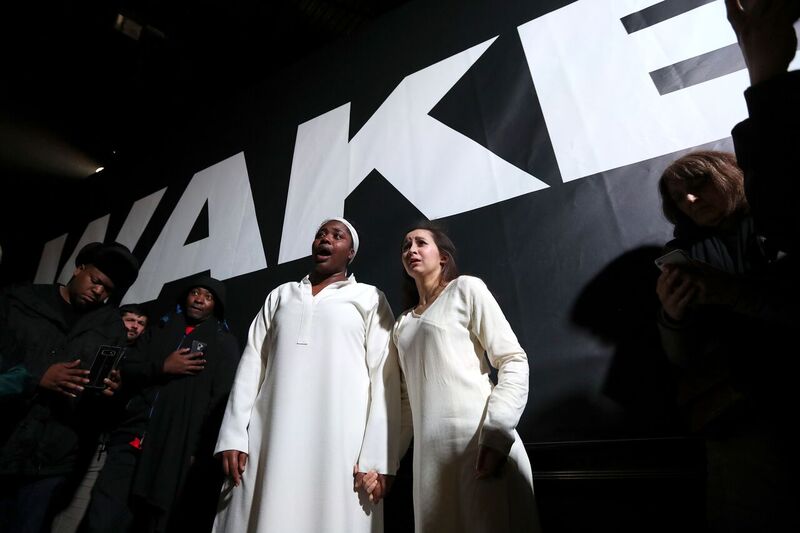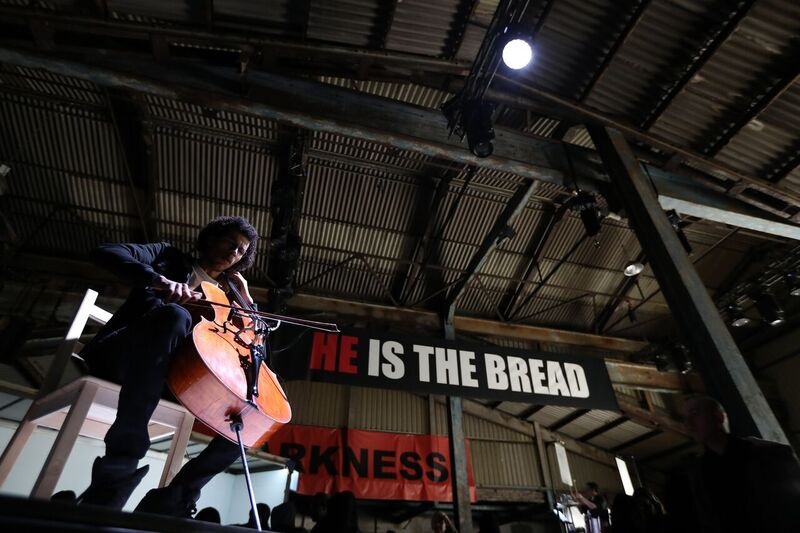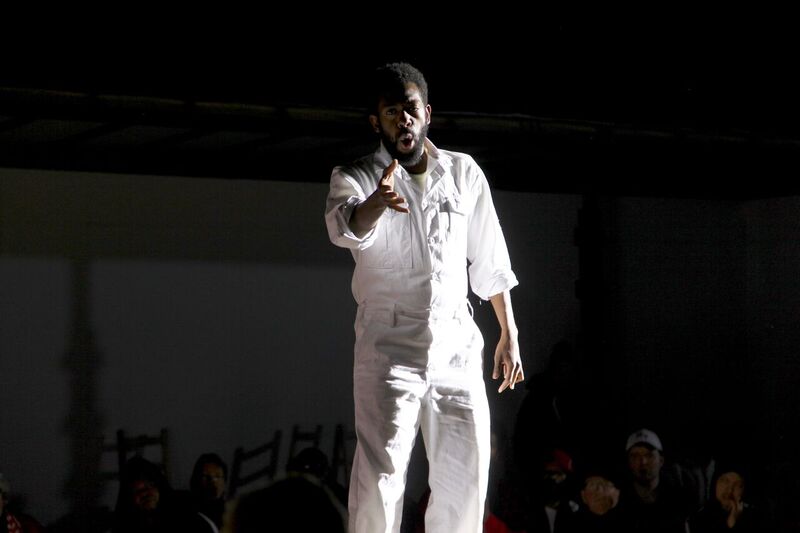Wake, Birmingham Opera Company review - power to the people | reviews, news & interviews
Wake, Birmingham Opera Company review - power to the people
Wake, Birmingham Opera Company review - power to the people
The chorus is the real star in Giorgio Battistelli's ambitious operatic parable

“Would you like a veil?” asked a steward, offering a length of black gauze, and when you’re at a production by Birmingham Opera Company it’s usually wisest to say yes.
So the world premiere of Giorgio Battistelli’s Wake opened on a vast gloomy warehouse dotted with trailers on which cast members, lit in brilliant white, mimed out activities ranging from swimming to childbirth. An amplified cellist played a low tremolando on a platform; percussionists placed around the room on further platforms responded with shimmers and chimes. Saurian cries occasionally emanated from a brass heavy orchestra, half hidden to one side, while Vick’s chorus – embedded in the promenading audience - responded with sighs and moans. Compelling, unsettling, immersive: we’ve come to expect this from Birmingham Opera Company, and Battistelli has created a music drama tailored to those strengths. The company calls him “Italy’s greatest living composer” - well, that’s Salvatore Sciarrino told. But the commitment of everyone involved was beyond question, particularly the 140 (at least) strong community chorus and acting company, whose absorption in their roles and mastery of Battistelli’s complex, richly layered score gave the whole piece its character: by turns menacing, consoling and viscerally thrilling.
The story is based on the New Testament tale of Lazarus, and after a lengthy first scene which only hinted at Battistelli’s lyrical gifts (a cor anglais player and two accordionists processed mournfully through the throng), the music lit up as Giuseppe di Iorio’s stark lighting swung onto Lazarus’s sisters Martha (Nardus Williams) and Mary (Mimi Doulton), and Jesus (Elliott Carlton Hines, pictured below) - a painfully human Messiah, intimidated equally by his own powers and the fickleness of the crowd. The same qualities that make a BOC production so memorable can also be problematic. I got close enough to see the panic flickering across Hines’s eyes, and to hear the moment at which Williams’s guttural wails of grief filled out and flowered into operatic melisma. But depending on where you’re standing in the warehouse, you’re unlikely to be able to decipher more than 50% of the words, and as the audience and chorus were ushered into a corner of the warehouse, with the orchestra making apocalyptic noises in the distance, the climactic act of resurrection will have been visible only to the handful who were able to push their way to the front.
No-one, however can have missed the raw, radiant blast of tone that Hines unleashed as he woke Lazarus (Joshua Stewart) who, after reacting with very plausible shock to his reanimation, found an eloquent lyricism that nicely complemented the ringing vocal warmth of both Williams and Doulton (pictured below). Battistelli let fly here too. Splashes of Berg and Messiaen were studded with glinting shards of Reich-like motor rhythms on two pianos, and the orchestra under Jonathon Heyward (who presumably had enough on his hands simply holding his scattered forces together) really soared. It proved to be the score’s musical peak. Jesus was dragged away into an outraged crowd, and the music was lost (as it tends to be when the spoken word enters) behind a sequence of spoken tableaux. A series of cartoonish, generic acts of intolerance, orchestrated by brutish policemen, culminated in Jesus being winched onto what looked like an Oak Furniture Land crucifix. The League of Gentlemen’s Legz Akimbo meets Rik Mayall’s People’s Poet: the pigs are, like, fascists, yeah?

rating
Share this article
Add comment
The future of Arts Journalism
You can stop theartsdesk.com closing!
We urgently need financing to survive. Our fundraising drive has thus far raised £49,000 but we need to reach £100,000 or we will be forced to close. Please contribute here: https://gofund.me/c3f6033d
And if you can forward this information to anyone who might assist, we’d be grateful.

Subscribe to theartsdesk.com
Thank you for continuing to read our work on theartsdesk.com. For unlimited access to every article in its entirety, including our archive of more than 15,000 pieces, we're asking for £5 per month or £40 per year. We feel it's a very good deal, and hope you do too.
To take a subscription now simply click here.
And if you're looking for that extra gift for a friend or family member, why not treat them to a theartsdesk.com gift subscription?
more Opera
 Carmen, English National Opera review - not quite dangerous
Hopes for Niamh O’Sullivan only partly fulfilled, though much good singing throughout
Carmen, English National Opera review - not quite dangerous
Hopes for Niamh O’Sullivan only partly fulfilled, though much good singing throughout
 Giustino, Linbury Theatre review - a stylish account of a slight opera
Gods, mortals and monsters do battle in Handel's charming drama
Giustino, Linbury Theatre review - a stylish account of a slight opera
Gods, mortals and monsters do battle in Handel's charming drama
 Susanna, Opera North review - hybrid staging of a Handel oratorio
Dance and signing complement outstanding singing in a story of virtue rewarded
Susanna, Opera North review - hybrid staging of a Handel oratorio
Dance and signing complement outstanding singing in a story of virtue rewarded
 Ariodante, Opéra Garnier, Paris review - a blast of Baroque beauty
A near-perfect night at the opera
Ariodante, Opéra Garnier, Paris review - a blast of Baroque beauty
A near-perfect night at the opera
 Cinderella/La Cenerentola, English National Opera review - the truth behind the tinsel
Appealing performances cut through hyperactive stagecraft
Cinderella/La Cenerentola, English National Opera review - the truth behind the tinsel
Appealing performances cut through hyperactive stagecraft
 Tosca, Royal Opera review - Ailyn Pérez steps in as the most vivid of divas
Jakub Hrůša’s multicoloured Puccini last night found a soprano to match
Tosca, Royal Opera review - Ailyn Pérez steps in as the most vivid of divas
Jakub Hrůša’s multicoloured Puccini last night found a soprano to match
 Tosca, Welsh National Opera review - a great company reduced to brilliance
The old warhorse made special by the basics
Tosca, Welsh National Opera review - a great company reduced to brilliance
The old warhorse made special by the basics
 BBC Proms: The Marriage of Figaro, Glyndebourne Festival review - merriment and menace
Strong Proms transfer for a robust and affecting show
BBC Proms: The Marriage of Figaro, Glyndebourne Festival review - merriment and menace
Strong Proms transfer for a robust and affecting show
 BBC Proms: Suor Angelica, LSO, Pappano review - earthly passion, heavenly grief
A Sister to remember blesses Puccini's convent tragedy
BBC Proms: Suor Angelica, LSO, Pappano review - earthly passion, heavenly grief
A Sister to remember blesses Puccini's convent tragedy
 Orpheus and Eurydice, Opera Queensland/SCO, Edinburgh International Festival 2025 review - dazzling, but distracting
Eye-popping acrobatics don’t always assist in Gluck’s quest for operatic truth
Orpheus and Eurydice, Opera Queensland/SCO, Edinburgh International Festival 2025 review - dazzling, but distracting
Eye-popping acrobatics don’t always assist in Gluck’s quest for operatic truth
 MARS, Irish National Opera review - silly space oddity with fun stretches
Cast, orchestra and production give Jennifer Walshe’s bold collage their all
MARS, Irish National Opera review - silly space oddity with fun stretches
Cast, orchestra and production give Jennifer Walshe’s bold collage their all
 Káťa Kabanová, Glyndebourne review - emotional concentration in a salle modulable
Janáček superbly done through or in spite of the symbolism
Káťa Kabanová, Glyndebourne review - emotional concentration in a salle modulable
Janáček superbly done through or in spite of the symbolism



Comments
The cellist on the platform
Thank you for this - amended
Thank you for this - amended accordingly. It wasn't always possible to get close enough to identify individual performers last night, and only one cellist is listed in the programme. But then, part of the joy of BOC productions is that nothing is ever entirely as you expect it!
Cate - "Jonathan"?
Great Review but having been
See Richard's comment above.
See Richard's comment above. Thanks for reinforcing the point.
Thanks for this, Richard.